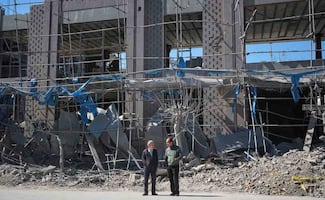Más Información

Precio del petróleo se dispara de nuevo por la guerra en Irán; conflicto en Medio Oriente sacude bolsas globales

SRE reporta 321 mexicanos evacuados ante conflicto en Medio Oriente; no hay afectados en su integridad

"Buenas tardes, ¿hay alguien?"; la historia de las cabañas y la narconómina de "El Mencho", Con los de Casa

Reforma Electoral: Sheinbaum no ve una "traición" del PT ni del Verde; acusa groserías en su contra y pide ver al "MCPRIAN"

Venta del 24% de Banamex fue el día del operativo contra “El Mencho” y nadie dudó: Chico Pardo; destaca la confianza en México
Demonstrators have swarmed the heart of the Belarus capital of Minsk on the ninth straight day of mass protests in a call for authoritarian President Alexander Lukashenko to resign after 26 years of iron-fisted rule that was extended in the August 9 election that protesters denounced as rigged.
His main challenger, Sviatlana Tsikhanouskaya , posted a new video in which she disputed the results of the vote—officials reported that Lukashenko won 80% of the vote to win a sixth term in office—and demanded that the government start a dialogue with demonstrators.
The ferocious crackdown has left hundreds injured as police have dispersed the largely peaceful demonstrations with stun grenades, tear gas, rubber bullets and severe beatings. At least 7,000 were detained by riot police, with many complaining they were beaten mercilessly. One protester was killed and hundreds were wounded.
The brutal suppression of protests drew harsh criticism in the West. European Union foreign ministers said they rejected the election results and tasked officials with drawing up a list of people in Belarus who could face sanctions over their role in the crackdown.
Thousands of factory workers who previously formed the core of Lukashenko’s base have joined the protests, denouncing the police crackdown and demanding a new election , raising the prospect of a nationwide strike.
On the ninth straight day of mass protests, Lukashenko said the country could have a new presidential election, but only after approving an amended version of its constitution in a nationwide referendum—an apparent bid to buy some time amid the growing political crisis .
The proposal didn’t assuage thousands of protesters who again converged on the capital’s main Independence Square in the evening to continue pushing for Lukashenko to step down .
Lukashenko told the factory workers that those who intend to strike could leave if they want, but he added that the protests are ruining the economy and said the country would collapse if he steps down.
Miners
at the huge potash factory in Soligorsk also said they were joining the strike. The giant Belaruskali factory that accounts for a fifth of the world’s potash fertilizer output is the nation’s top cash earner.
The workers want Lukashenko to give way to Sviatlana Tsikhanouskaya, the leading opposition candidate in the election.
Lukashenko spoke twice with Putin over the weekend and reported the Russian leader told him Moscow stands ready to provide support in the face of what he described as foreign aggression. He claimed that NATO nations are beefing up military forces on the border with Belarus—a claim the alliance rejected.
NATO Secretary-General Jens Stoltenberg reaffirmed Monday that the alliance has no military buildup in the region. “We remain vigilant, strictly defensive, and ready to deter any aggression against NATO allies,” he said.
Lithuanian officials pointed at a military exercise Belarus abruptly launched near the borders of Lithuania and Poland on Monday and warned about worrying signs that Russia might be planning to use the situation to take over Belarus.
The official results of the election gave Lukashenko 80% of the votes and Tsikhanouskaya only 10%, but the opposition claimed the outcome was falsified . Tsikhanouskaya has cited reports from precincts around the country showed her winning 60%-70% of the vote.
The 37-year-old former teacher left for neighboring Lithuania on August 11 under what her associates described as pressure from law enforcement officials. Her husband, an opposition blogger, has been jailed since May, and she had replaced him on the ballot.
In a video statement on Monday, Tsikhanouskaya said she was prepared to step in.
“I’m ready to take on the responsibility and act as a national leader in order for the country to calm down, return to its normal rhythm, in order for us to free all the political prisoners and prepare legislation and conditions for organizing new presidential elections,” she said.
sg
Noticias según tus intereses
[Publicidad]
[Publicidad]









